- Home
- Pat Barker
The Women of Troy: A Novel Page 9
The Women of Troy: A Novel Read online
Page 9
“What do you think it means?” A slightly mischievous question.
“Ah. The interpretation of omens requires many hours of thought and prayer.”
Once again, stiff—how could he possibly be unmoved by the experience we’d just shared? But I bowed to acknowledge his superior wisdom—and watched him walk away towards Agamemnon’s compound, noticing how his steps slowed as he approached the gate. The gossip was he’d fallen out of favour, that Agamemnon no longer bothered to consult him, and, seeing him dawdle like that, almost literally dragging his feet, I had no difficulty believing it.
Ever since the fall of Troy, I’d been living from hour to hour, without energy and without hope. Now, suddenly, I felt alive again—more than excited—elated. Somehow the encounter with the eagle changed everything. I’d come face to face with one of the lords of life, and the experience lifted my mood beyond recognition—even though the impression I took away with me was one of pure savagery. As a woman living in this camp, I was navigating a complex and dangerous world, but the eagle—everything he saw was his by right. Because he was perfection: every feather, every curve of that hooked beak, every glint of his sunlit eyes—they were all exactly as they ought to be. He was older than the gods. And for a moment, just for one moment, I’d been up there with him, gazing on the wrinkled sea and the earth-bound creatures toiling far below. When he looked down, he saw…dinner. Nothing else—nothing complex, nothing difficult, nothing that could possibly be a threat—just dinner. There was a grandeur in the simplicity of it—and I hated the idea of Calchas rubbing his smeary fingers all over it, trying to extract a “meaning.” The eagle was its own meaning.
That night, I lay awake, thinking about Helen and Hecuba, about my sister, who I had to hope was dead, and my lost brothers. The same thoughts that preoccupied me every night. But when eventually I slept, I dreamt about the eagle—as I did on many of the nights that followed. When, just before dawn, I woke, I lay in darkness, listening to the wind, and I thought of Calchas, who was also, I felt sure, lying awake staring into this same darkness, remembering the eagle and trying desperately to work out what this “sign,” this portent, this “message from the gods,” might mean.
12
The blaze of energy I felt after seeing the eagle stayed with me. I started looking for ways to make things better for the captive girls. So far, they hadn’t been able to use the yard behind their hut because a section of the fence had been blown flat. Now, with a great deal of help from Alcimus, I managed to get the fence repaired and the ground cleared. It wasn’t easy because the Greeks resented spending time and effort on huts they were always about to leave, but once they started on the job, it took them less than an hour. It gave the girls privacy and some shelter from the wind. That afternoon I baked cakes and two huge trays of sweetmeats and set them aside to cool. I was tired of the loneliness of my hut and looking forward to an evening with the other women.
As soon as night fell, three of the girls helped me carry trays of food and jugs of wine into the yard and we spread them on rugs around the fire. Wary at first, the other girls emerged from the hut like animals let out of a pen, sniffing the air. One or two of them actually looked back at the hut as if they’d felt safer indoors, but most seemed to enjoy the extra freedom. The fire was sulky, but they crouched round it, blowing on twigs, feeding handfuls of dry grass into the flames, finally whooping with triumph when a big log started to burn.
I’d been hoping Andromache might join us, but she stayed in her room. I tapped on her door and asked if she was all right, but got only a grunt in reply. Going back outside, I saw the fire was roaring now, sparks whirling up into the sky, shadows flickering across the girls’ faces. The air was clear, but chilly; we gathered close round the flames, our toes only inches away from the hearth stones. I’d brought drums and pipes—Alcimus kept a great collection of instruments in his hut. I thought one or two of the girls might know how to play the pipes and the rest of us could surely manage to beat time on the drums. I’d also brought Alcimus’s lyre—with his permission, of course—though I’d need to be careful with that and wipe off any sticky fingerprints, because it was a good instrument, valuable. Not the equal of Achilles’s lyre, but better than most—and it was kind of him to lend it to us. Amina, it turned out, could play the lyre—rather well, in fact—but the real find was Helle, who could play not only the lyre but the pipes as well. In her previous life, she’d been a public entertainer, a dancer, musician and acrobat, her experience as far removed from the sheltered existence of the other girls as you could possibly imagine. She’d been a slave, as such performers generally were, though the best of them were famous throughout the city.
At last, we were all settled. Amina and Helle nodded to show they were ready. “Nothing sad,” I said. The girls began calling out their favourites—and many of them were happy, even jolly, songs; but as soon as the singing started, they all sounded sad. Perhaps all songs do when they’re sung in exile. Soon, many of the girls were in tears. Maire—a lumpish girl whose eyebrows met in the middle—positively wailed. But still, they went on singing; even the two girls who still couldn’t speak at all, sang. And that amazed me. I hadn’t realized till then that people who’ve been shocked into muteness can still sing.
Helle, who was far from sympathetic, stared incredulously at the sobbing girls, and began playing something so fast and furious they struggled to keep up, clapping and gabbling until, with a final flourish of the drums, they collapsed into helpless giggles.
“Again!” I stood up, raising my arms to encourage them to do the same, and one by one they got to their feet. The music started again—only now there was foot-stamping as well, and our shadows, thrown by the flames, leapt over the walls that fenced us in and escaped into the night.
As we all sat down again, I glanced across at Amina, but she was busy adjusting the strings on the lyre and neatly avoided my gaze. This was becoming a pattern and she was very good at it. She never seemed to be avoiding me, but somehow, she always happened to be on the other side of the room or, in this case, the fire. It made me uneasy, but I brushed it aside. I didn’t want anything to spoil this evening.
When she’d finished fiddling with the strings, she began singing a love song. She had a high, clear voice, like a boy’s before it breaks; you don’t often find that quality in a woman’s voice and it’s heartbreaking when you do. Many of the girls were crying again; I wondered how many of them had been promised in marriage to young men whose bodies now lay rotting inside the walls of Troy. They needed to grieve, but after a while I began to feel the weeping had gone on long enough. I looked at Helle, who pulled a face and shrugged: What can you do with them? But then, a moment later, she was on her feet and dancing, clapping her hands above her head in time with the stamping of her feet. I picked up a drum, as did several others, and the rest started clapping. Soon, all of us, in various ways, were carrying the beat.
I’ve never seen any girl dance the way Helle danced that night. At weddings and religious festivals, girls do dance, but always modestly, covered from collarbone to ankle in flowing robes, careful not to let their gaze stray beyond the movements of their feet. Helle was wearing a sleeveless tunic, the hem well above her knees—basically, a man’s tunic. Her oiled skin gleamed in the firelight, her elaborately braided hair swung around her shoulders, as the stamping and clapping gathered pace.
Of all the girls—well, apart from Amina—Helle was the one who stood out. There weren’t many in the camp who hadn’t lost all their male relatives and, since older women were sent to the slave markets, the younger girls had lost their mothers as well. Only Helle showed no sign of grief. She’d seen her owner speared in the throat, flapping on the floor like a landed fish, the life choked out of him in front of her eyes. When I murmured some tentative words of sympathy, she’d laughed out loud. “Oh, don’t worry,” she said. “I’d been wanting to do that for years.”
&n
bsp; She’d been bought when she was very young, no more than six or seven years old, and she had no memory of her life before that day in the slave market, so, in effect, she’d been born into a life of physical pain. Her owner selected her by forcing her thumbs back till they touched her wrists and then making her lie on her back while he twisted her legs round and round in their sockets. He’d trained her as an acrobat, a singer, a dancer, a musician; she’d been the star performer in a troupe that regularly appeared at Priam’s court. Of course, her owner made her available for other services too, but only to the most prestigious clients, and even then, at an exorbitant price. Poor Helle. She was, in some ways, the most pitiable of all the girls—though she would certainly not have said so!—free from grief, yes, but only because her previous life had been devoid of love.
The drumbeats and clapping were getting faster, keeping pace with Helle’s dancing feet. I wondered why she was putting so much effort into this performance for an all-female audience when she’d always treated the other girls with such contempt. For the sheer joy of it, perhaps? Her dance had become a flirtation with the fire. She’d approach close enough to draw oohs from the girls, then retreat a little, only to flutter back like a moth drawn to a flame. The firelight gleamed on her arms and legs, which were slender but muscular. She looked like a boy—graceful, even beautiful—but still a boy. And this was a warrior’s dance.
Outside the circle of light, her shadow kept her company, flickering along the fence. The fire lit up the faces of the watching girls, who were entirely lost in the music. One or two of them even stood up and began to stamp their feet too, though that just served to throw Helle’s grace and power into sharper relief. I looked around the circle, and then again at Helle’s dancing shadow. I was aware of something on the fringes of my vision. At first, I couldn’t think what it was, but then a movement from inside the hut caught my eye. I hoped it was Andromache, that she’d decided to join us, after all—but a second later, peering into the darkness, I recognized Pyrrhus. He had a perfect right to be there, since he owned the hut and everybody in it. Except me. I nursed that thought, cradling it against the dark. Except me.
The drums were pounding now. Seeing Helle measure the height of the fire, I tried to shout No! but she was already running and, before I could say anything, she’d leapt high in the air and landed lightly on the other side. The flames whirled in the wind of her passing, as if they were reaching out to get her, but she just stood there, laughing, punching the air, as men do after they’ve won a race. “Are you all right?” I asked. By way of reply, she extended one beautiful leg towards me. At first, I couldn’t see anything, but then I noticed a shiny, red patch above the ankle.
“A fire-kiss.” I must have looked concerned because she laughed again. “It doesn’t hurt.”
Her gaze slid to the door of the hut, but Pyrrhus had withdrawn into the shadows. So, she’d known he was there. She’d known all along.
A whiff of smoke from her braided hair, as she sat down to cheers and a cup of wine. Only Amina looked unimpressed; positively disapproving, in fact. Helle stared straight at her and lifted her cup in a mocking toast. I sensed that they hated each other, those two, and that was a pity, because both of them were strong characters, natural leaders. Together, they could have done so much, but neither of them seemed inclined to take on the role that should rightfully have been Andromache’s. Amina, because she was following the straight and narrow path of religious purity; Helle, because she was focused exclusively on her own survival. And the other girls were just lost. All of them—lost. So, it fell to me, I suppose. I knew they looked up to me, they trusted me—simply because I’d survived in this nightmarish place to which the loss of their homes and families had brought them.
Not long after that, Pyrrhus sent for Helle; almost immediately, in fact, while we were still sitting in the yard. He’d scarcely have had time to get back to the hall. “YES!” Helle shouted, raising both arms above her head.
I thought that was the last we’d see of her till morning, but when, finally, we tore ourselves away from the fire, we found her curled up on her pallet bed with the blanket pulled up to her chin.
“What happened?” I asked.
“Nothing happened. He just wanted me to watch him wank.”
The girls looked at each other and I realized not one of them knew what the word meant.
It was odd, and this wasn’t the first time I’d been aware of the oddity. Pyrrhus was a young man, not fully grown, and yet he showed very little interest in these girls. Until he’d sent for Helle, no interest at all. And he seemed to regard sleeping with Andromache as more of a punishment than a pleasure. Alcimus hadn’t said anything about it. Perhaps he just wasn’t aware of it, though I did wonder whether it formed part of that wordless conversation he and Automedon carried on for so much of the time.
Half an hour later, safe and warm in my own bed, I looked back over the evening and thought it had been a great success. Obviously, it would have been better if Andromache had joined us, but even without her the girls had come together as a group in a way they’d never done before. I was pleased. I kept telling myself how pleased I was, because I was aware of a growing uneasiness and I couldn’t put my finger on it. Because Helle had been summoned by Pyrrhus? No, it wasn’t that. Better her than one of the other girls. Anyway, she couldn’t wait to get into the hall; she was nakedly ambitious. No, it was no use, I couldn’t pin down why I felt that something was wrong, but I wasn’t going to lie awake worrying about it.
Blowing out the candle, I pulled the covers up and stared into the darkness, my eyes smarting from the smoke of the fire. I could smell it on my skin and in my hair. Bath, tomorrow, first thing. All the time, involuntarily, my brain went on sifting through the events of the evening. What was it? Something didn’t fit. And then, on the edge of sleep, I realized: that moment, right at the end, when the girls had gathered round Helle’s bed, their faces full of curiosity and fear, I’d looked around the circle, noticing how bewildered and ignorant they all were. Now, I closed my eyes, trying to re-create that scene because I needed to be sure, and slowly, one by one, the faces swam into focus, even the two mute girls whose names I still didn’t know. All of them—except Amina. Amina hadn’t been there.
I told myself it didn’t matter, that she’d probably just stayed behind in the yard, gathering up the cups and dampening down the fire. That would have been like her; she was always tidying up the mess in the overcrowded hut, and becoming tetchy and frustrated when the other girls didn’t keep it that way. Still, I was a bit concerned. I even wondered if I should get up and check to see if she was all right, but they’d all be asleep by now. No, it could wait till morning. I tossed from side to side, while the baby turned somersaults as it always did if I was upset. At last I found a position that suited both of us, but even so it was a long time before I got to sleep.
13
Calchas is dreaming, as he often does now, about his childhood in Troy, long before he became a priest, back in the days when he was, nominally at least, his father’s apprentice in the blacksmith’s shop. A skinny, pasty-faced kid, all thumbs, slow to move in response to his father’s barked orders and not nearly fast enough to dodge his fists. Inclined to slope off into the house where his mother is baking in the kitchen—smells of warm bread and cinnamon, the rush of heat as she takes loaves from the oven, sticking her bottom lip out to blow strands of hair away from her flushed face. She pauses for a moment as he bursts in, presses his swollen face against her hot side, but she daren’t say too much; she’s even more frightened of his father than he is. Calchas stirs and briefly wakes, remembering his mother. A mouse-like little woman, she seems to him now, who had once been his entire world. Always praying, every feast day at the temple, a little in love with the priest, perhaps? A bruise here and there, though nothing her husband didn’t have a perfect right to inflict, she wasn’t complaining, only she did wish he
wouldn’t be so hard on the boy. And then, one day, the obvious solution presented itself. Calchas remembers it as a day of talk behind closed doors, his father’s rumble going on and on, and then the priest’s voice, reedy but authoritative, rising above it—and suddenly his few possessions are being bundled together and he’s following the priest, a respectful three paces behind, along the narrow, winding alleys, the congested streets, which till now are all he’s ever known, to the sunlit squares and splendid temples near the citadel. Different smells here: flowers, incense, the ferrous smell of blood from the sacrifices. And meat, always meat, so much meat. He’s leaving behind the awful smells of the tannery, the glue factory and the knacker’s yard, though they linger on his skin till he’s had the ceremonial bath—and then they’re gone, along with the smell of baking bread and cinnamon.
Once a month, he’s allowed to go home, and at first he longs for that day, even marks the days on the ground with a piece of chalky stone, but then increasingly with every visit he ceases to belong in the neighbourhood and even in his own home—as if he were in a fast-moving ship and his mother was just a tiny figure waving from the shore.
After a night of confused dreams, he wakes with a dry mouth, his eyelids stuck together; he doesn’t often drink strong wine but last night he had—his head’s pounding. He’s spent the last days and nights waiting for a summons from Agamemnon that he knows must be coming soon; but when, at long last, there’s a knock on his door it’s not the imposing figure of the king’s herald he sees standing there, but Lord Nestor’s slave girl: his “prize of honour” as the Greeks say. He remembers this girl vaguely from the times he’d dined in Nestor’s hall, though it takes a few seconds to recall her name. Hecamede, that’s it. His first thought is that Nestor’s dead—there’ve been rumours about his health ever since his youngest son was killed—and Calchas feels his brain bulge with the effort of calculating what Nestor’s death will mean for the already fragile balance of power within the camp, but a moment later he realizes it’s all nonsense—news of a king’s death is proclaimed by heralds, not carried by slaves. He’s still struggling to wake up, to shake off the last vestiges of sleep. When, at last, the girl speaks, she says, in a remarkably sweet, modest way, “Hecuba would like to see you.”

 Border Crossing
Border Crossing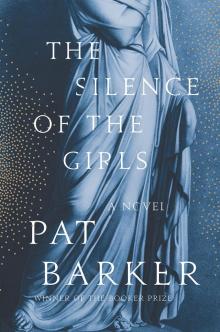 The Silence of the Girls
The Silence of the Girls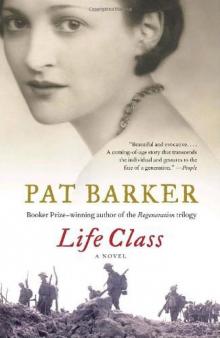 Life Class
Life Class Regeneration
Regeneration Another World
Another World The Ghost Road
The Ghost Road Double Vision
Double Vision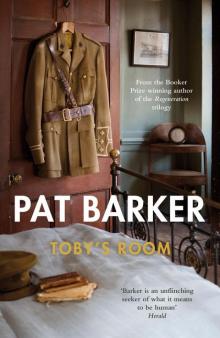 Toby's Room
Toby's Room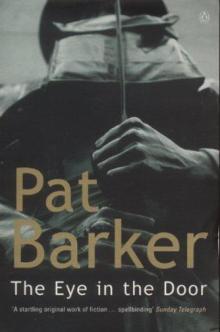 Regeneration Trilogy 02 - The Eye in the Door
Regeneration Trilogy 02 - The Eye in the Door The Eye in the Door
The Eye in the Door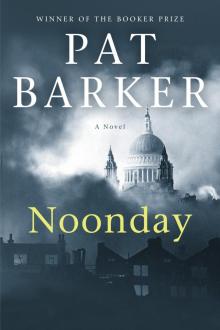 Noonday
Noonday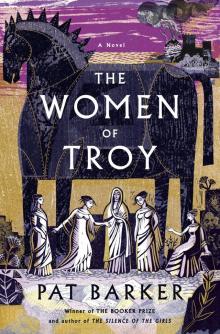 The Women of Troy: A Novel
The Women of Troy: A Novel